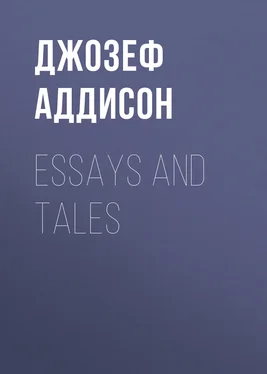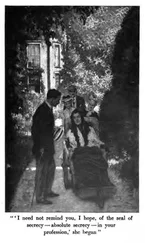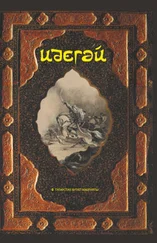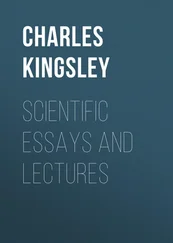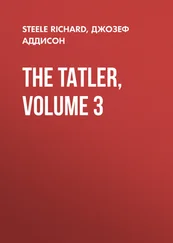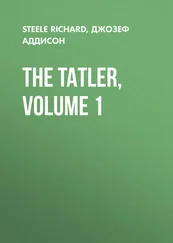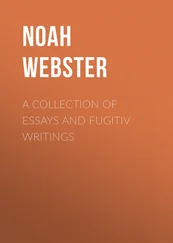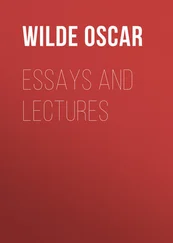Джозеф Аддисон - Essays and Tales
Здесь есть возможность читать онлайн «Джозеф Аддисон - Essays and Tales» — ознакомительный отрывок электронной книги совершенно бесплатно, а после прочтения отрывка купить полную версию. В некоторых случаях можно слушать аудио, скачать через торрент в формате fb2 и присутствует краткое содержание. Жанр: foreign_prose, foreign_antique, на английском языке. Описание произведения, (предисловие) а так же отзывы посетителей доступны на портале библиотеки ЛибКат.
- Название:Essays and Tales
- Автор:
- Жанр:
- Год:неизвестен
- ISBN:нет данных
- Рейтинг книги:5 / 5. Голосов: 1
-
Избранное:Добавить в избранное
- Отзывы:
-
Ваша оценка:
- 100
- 1
- 2
- 3
- 4
- 5
Essays and Tales: краткое содержание, описание и аннотация
Предлагаем к чтению аннотацию, описание, краткое содержание или предисловие (зависит от того, что написал сам автор книги «Essays and Tales»). Если вы не нашли необходимую информацию о книге — напишите в комментариях, мы постараемся отыскать её.
Essays and Tales — читать онлайн ознакомительный отрывок
Ниже представлен текст книги, разбитый по страницам. Система сохранения места последней прочитанной страницы, позволяет с удобством читать онлайн бесплатно книгу «Essays and Tales», без необходимости каждый раз заново искать на чём Вы остановились. Поставьте закладку, и сможете в любой момент перейти на страницу, на которой закончили чтение.
Интервал:
Закладка:
Joseph Addison
Essays and Tales
INTRODUCTION
The sixty-fourth volume of this Library contains those papers from the Tatler which were especially associated with the imagined character of Isaac Bickerstaff, who was the central figure in that series; and in the twenty-ninth volume there is a similar collection of papers relating to the Spectator Club and Sir Roger de Coverley, who was the central figure in Steele and Addison’s Spectator . Those volumes contained, no doubt, some of the best Essays of Addison and Steele. But in the Tatler and Spectator are full armouries of the wit and wisdom of these two writers, who summoned into life the army of the Essayists, and led it on to kindly war against the forces of Ill-temper and Ignorance. Envy, Hatred, Malice, and all their first cousins of the family of Uncharitableness, are captains under those two commanders-in-chief, and we can little afford to dismiss from the field two of the stoutest combatants against them. In this volume it is only Addison who speaks; and in another volume, presently to follow, there will be the voice of Steele.
The two friends differed in temperament and in many of the outward signs of character; but these two little books will very distinctly show how wholly they agreed as to essentials. For Addison, Literature had a charm of its own; he delighted in distinguishing the finer graces of good style, and he drew from the truths of life the principles of taste in writing. For Steele, Literature was the life itself; he loved a true book for the soul he found in it. So he agreed with Addison in judgment. But the six papers on “Wit,” the two papers on “Chevy Chase,” contained in this volume; the eleven papers on “Imagination,” and the papers on “Paradise Lost,” which may be given in some future volume; were in a form of study for which Addison was far more apt than Steele. Thus as fellow-workers they gave a breadth to the character of Tatler and Spectator that could have been produced by neither of them, singly.
The reader of this volume will never suppose that the artist’s pleasure in good art and in analysis of its constituents removes him from direct enjoyment of the life about him; that he misses a real contact with all the world gives that is worth his touch. Good art is but nature, studied with love trained to the most delicate perception; and the good criticism in which the spirit of an artist speaks is, like Addison’s, calm, simple, and benign. Pope yearned to attack John Dennis, a rough critic of the day, who had attacked his “Essay on Criticism.” Addison had discouraged a very small assault of words. When Dennis attacked Addison’s “Cato,” Pope thought himself free to strike; but Addison took occasion to express, through Steele, a serious regret that he had done so. True criticism may be affected, as Addison’s was, by some bias in the canons of taste prevalent in the writer’s time, but, as Addison’s did in the Chevy-Chase papers, it will dissent from prevalent misapplications of them, and it can never associate perception of the purest truth and beauty with petty arrogance, nor will it so speak as to give pain. When Wordsworth was remembering with love his mother’s guidance of his childhood, and wished to suggest that there were mothers less wise in their ways, he was checked, he said, by the unwillingness to join thought of her “with any thought that looks at others’ blame.” So Addison felt towards his mother Nature, in literature and in life. He attacked nobody. With a light, kindly humour, that was never personal and never could give pain, he sought to soften the harsh lines of life, abate its follies, and inspire the temper that alone can overcome its wrongs.
Politics, in which few then knew how to think calmly and recognise the worth of various opinion, Steele and Addison excluded from the pages of the Spectator . But the first paper in this volume is upon “Public Credit,” and it did touch on the position of the country at a time when the shock of change caused by the Revolution of 1688-89, and also the strain of foreign war, were being severely felt.
H. M.PUBLIC CREDIT
— Quoi quisque ferè studio devinctus adhæret
Aut quibus i rebus multùm sumus antè morati
Atque in quô ratione fuit contenta magis mens ,
In somnis cadem plerumque videmur obire .
—What studies please, what most delight,
And fill men’s thoughts, they dream them o’er at night.
In one of my rambles, or rather speculations, I looked into the great hall where the bank is kept, and was not a little pleased to see the directors, secretaries, and clerks, with all the other members of that wealthy corporation, ranged in their several stations, according to the parts they act in that just and regular economy. This revived in my memory the many discourses which I had both read and heard concerning the decay of public credit, with the methods of restoring it; and which, in my opinion, have always been defective, because they have always been made with an eye to separate interests and party principles.
The thoughts of the day gave my mind employment for the whole night; so that I fell insensibly into a kind of methodical dream, which disposed all my contemplations into a vision, or allegory, or what else the reader shall please to call it.
Methoughts I returned to the great hall, where I had been the morning before; but to my surprise, instead of the company that I left there, I saw, towards the upper end of the hall, a beautiful virgin, seated on a throne of gold. Her name, as they told me, was Public Credit. The walls, instead of being adorned with pictures and maps, were hung with many Acts of Parliament written in golden letters. At the upper end of the hall was the Magna Charta, with the Act of Uniformity on the right hand, and the Act of Toleration on the left. At the lower end of the hall was the Act of Settlement, which was placed full in the eye of the virgin that sat upon the throne. Both the sides of the hall were covered with such Acts of Parliament as had been made for the establishment of public funds. The lady seemed to set an unspeakable value upon these several pieces of furniture, insomuch that she often refreshed her eye with them, and often smiled with a secret pleasure as she looked upon them; but, at the same time, showed a very particular uneasiness if she saw anything approaching that might hurt them. She appeared, indeed, infinitely timorous in all her behaviour: and whether it was from the delicacy of her constitution, or that she was troubled with vapours, as I was afterwards told by one who I found was none of her well-wishers, she changed colour and startled at everything she heard. She was likewise, as I afterwards found, a greater valetudinarian than any I had ever met with, even in her own sex, and subject to such momentary consumptions, that in the twinkling of an eye, she would fall away from the most florid complexion and the most healthful state of body, and wither into a skeleton. Her recoveries were often as sudden as her decays, insomuch that she would revive in a moment out of a wasting distemper, into a habit of the highest health and vigour.
I had very soon an opportunity of observing these quick turns and changes in her constitution. There sat at her feet a couple of secretaries, who received every hour letters from all parts of the world, which the one or the other of them was perpetually reading to her; and according to the news she heard, to which she was exceedingly attentive, she changed colour, and discovered many symptoms of health or sickness.
Behind the throne was a prodigious heap of bags of money, which were piled upon one another so high that they touched the ceiling. The floor on her right hand and on her left was covered with vast sums of gold that rose up in pyramids on either side of her. But this I did not so much wonder at, when I heard, upon inquiry, that she had the same virtue in her touch, which the poets tell us a Lydian king was formerly possessed of; and that she could convert whatever she pleased into that precious metal.
Читать дальшеИнтервал:
Закладка:
Похожие книги на «Essays and Tales»
Представляем Вашему вниманию похожие книги на «Essays and Tales» списком для выбора. Мы отобрали схожую по названию и смыслу литературу в надежде предоставить читателям больше вариантов отыскать новые, интересные, ещё непрочитанные произведения.
Обсуждение, отзывы о книге «Essays and Tales» и просто собственные мнения читателей. Оставьте ваши комментарии, напишите, что Вы думаете о произведении, его смысле или главных героях. Укажите что конкретно понравилось, а что нет, и почему Вы так считаете.
